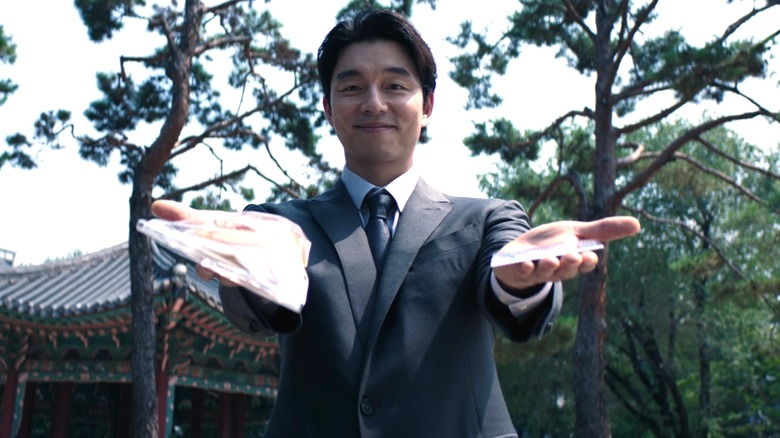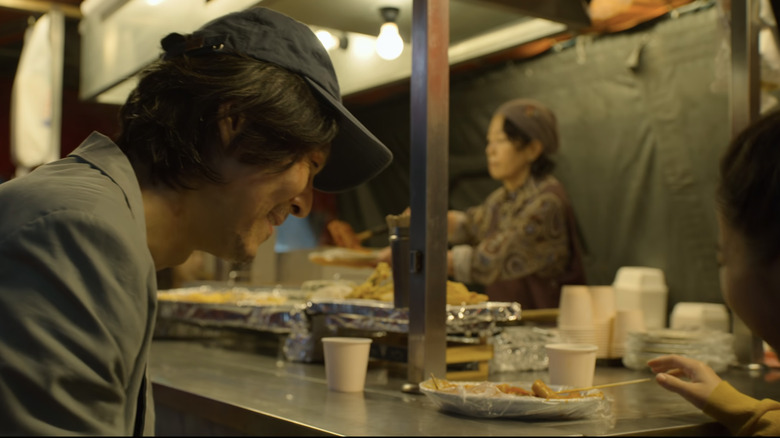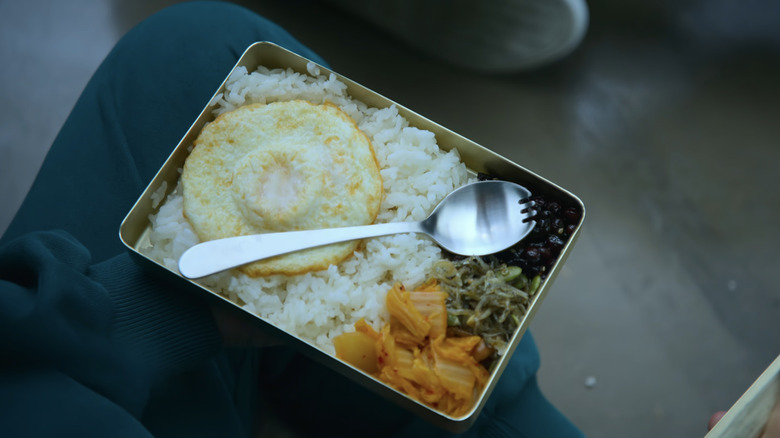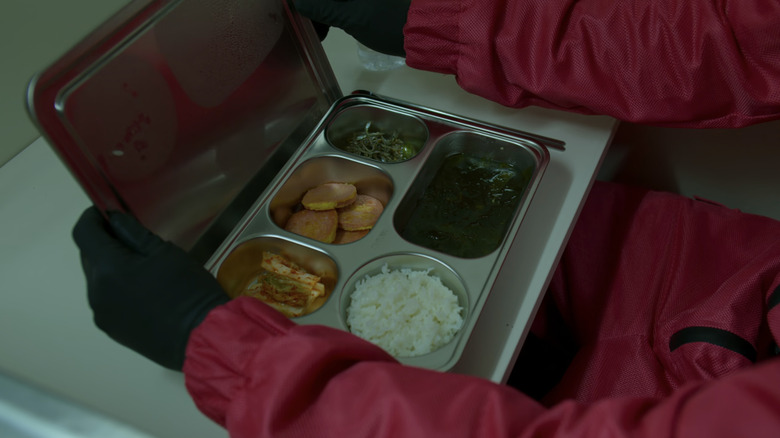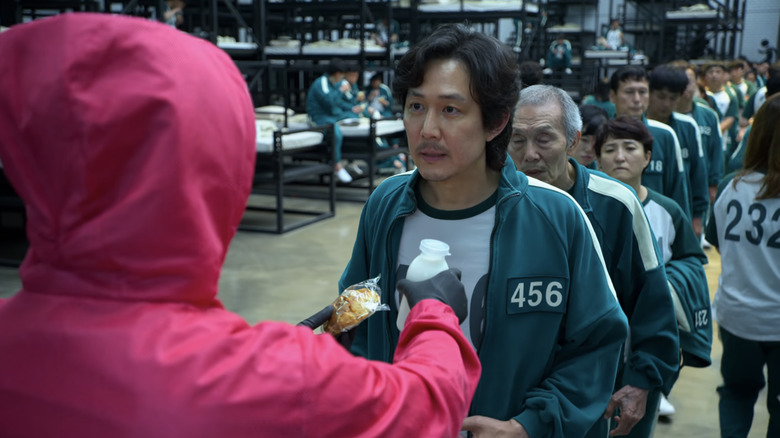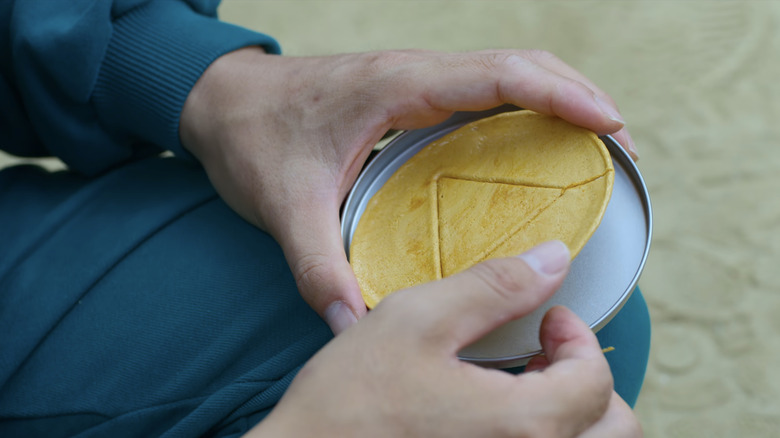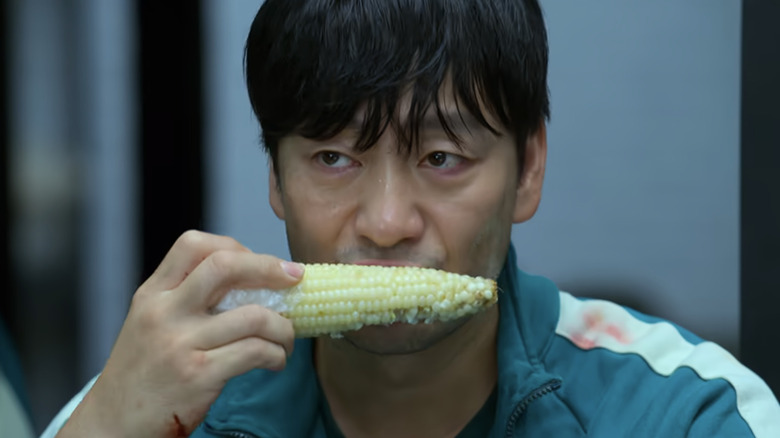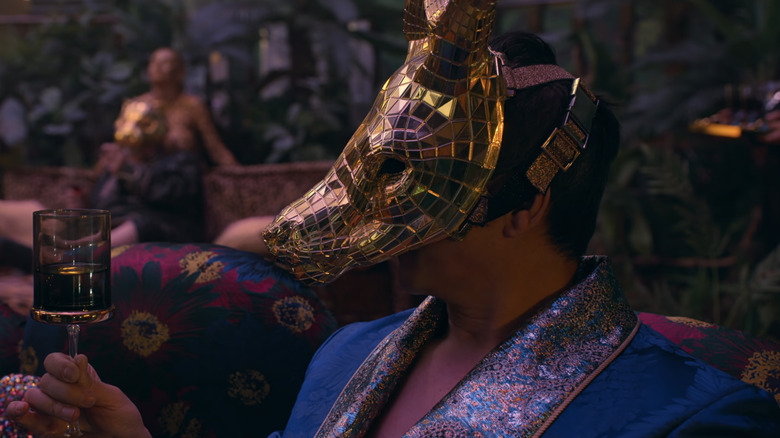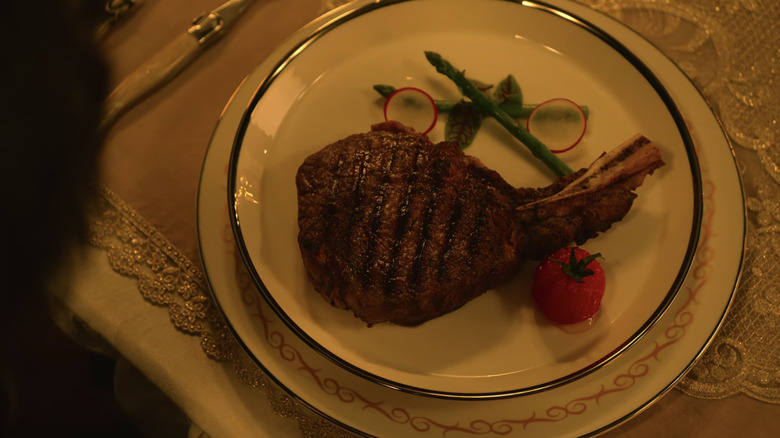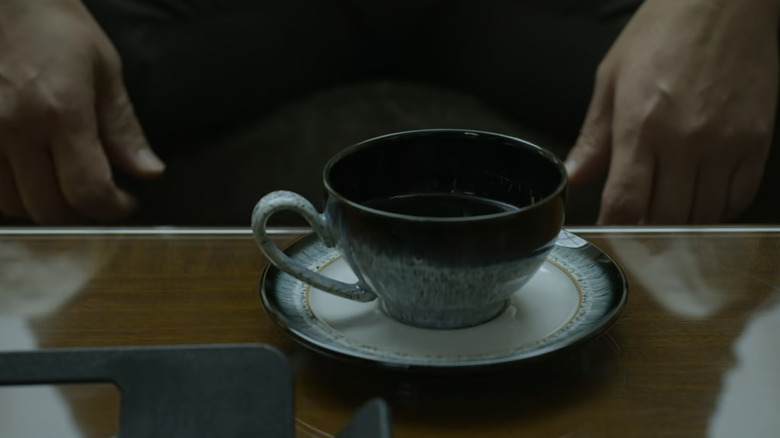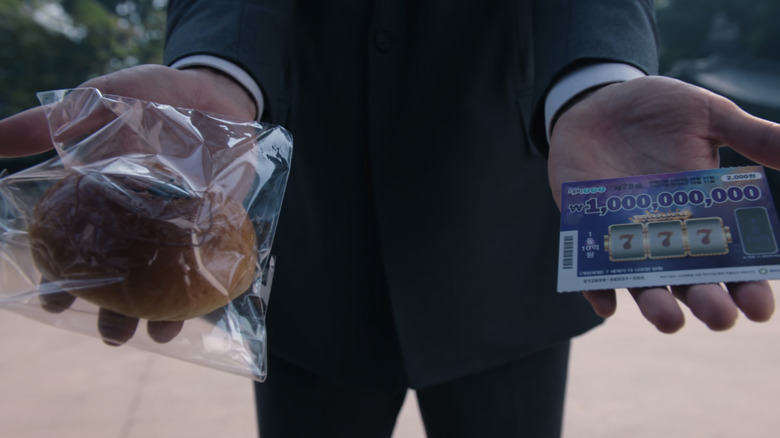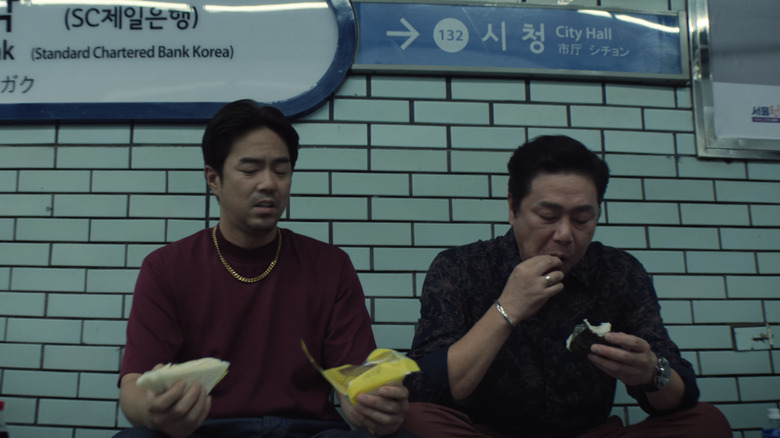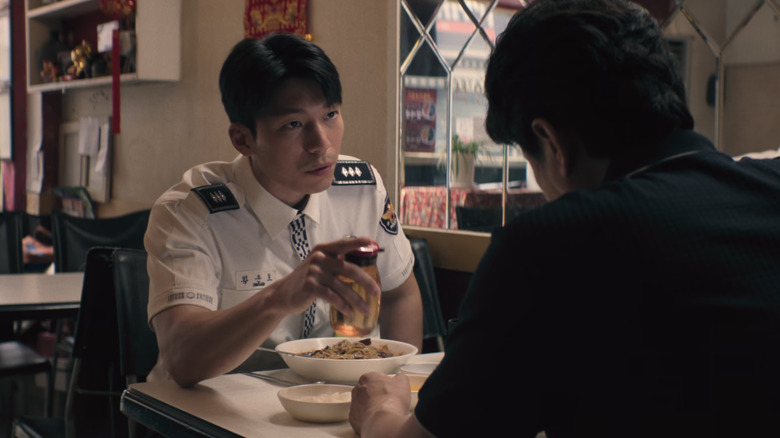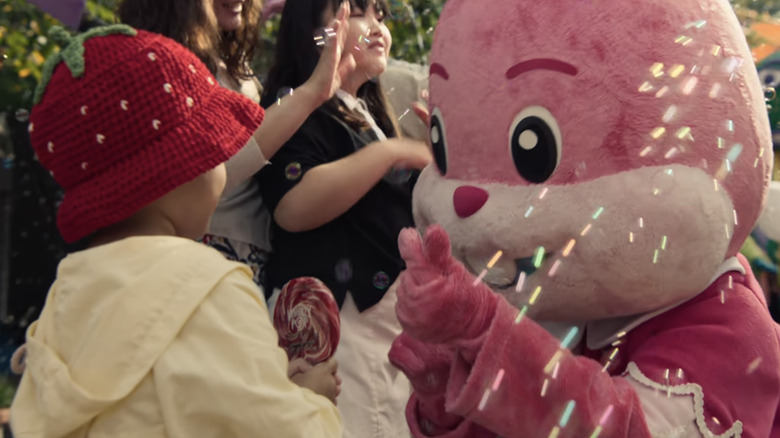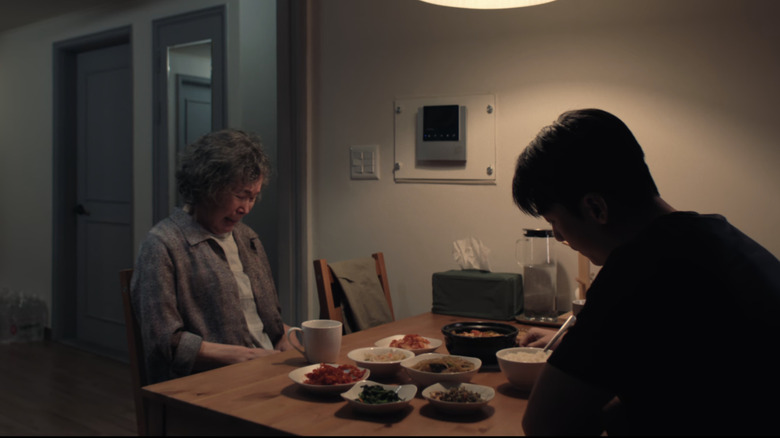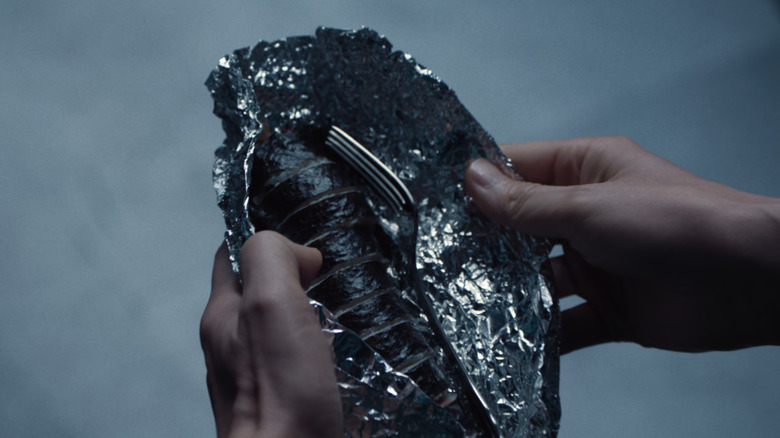15 Times Squid Game Used Food To Tell A Bigger Story
We may receive a commission on purchases made from links.
"Squid Game" has been one of the most massive releases on Netflix. In the four years that the show has been out it has become a pop culture staple. "Squid Game" costumes are infinitely recognizable, Roblox games have been made to replicate the show, and "Squid Game" has been merchandised. All of this can be slightly disturbing to watch as a fan of the show. Behind the bright colors, songs, and fun games that are seen in the show is a commentary on poverty and class division.
In Season 1, we follow the players as they try to survive and make it out of the game. In Season 2, we watch them try to fight back against the system. "Squid Game" conveys these themes of class in many subtle ways. Food is a universal experience. Food can tell us about a character's background, circumstances, and personality. Food is used to create dichotomies in the show between characters of different classes.
Tteokbokki (Season 1, Episode 1)
The entirety of the pilot episode of "Squid Game" introduces us to the final struggles of the main character, Seong Gi-hun (Lee Jung-jae). His choice in food displays his lower class status. When he wanted to treat his daughter for her birthday, he could only afford to buy her street food: tteokbokki or rice cakes in a hot sauce. He wanted to provide something more extravagant than street food, but she is more than grateful for the treat and time with her father. She tells him about the expensive steak dinner she had with her mother and stepfather, but not wanting to upset her father she says that this treat is even better. She is not normally allowed to have "junk food" and is excited for the opportunity.
The scene sets up the divide between higher class families and lower class families and what they are able to provide to their families. It is obvious that a large cause of Gi-Hun's financial stress is his desire to provide for his daughter. With Season 2 now released, the stark contrast in his priorities due to his traumatic experience with the games is shocking.
Lunch boxes (Season 1, Episode 3, Season 2, Episode 4)
After arriving at the game with hundreds of other competitors, it is revealed that there is a huge cash prize for making it to the very end. Seong Gi-hun and the rest of the players are served a small metal lunchbox akin to what school children are given for lunch. The box has rice, kimchi, vegetables, and a fried egg. Not an incredibly substantial meal, but hits all of the food groups to keep all of the players in the game. The players line up and receive their food as if they are in a food line, they are at the mercy of the guards that give them their food. The food is exactly the same for every player, no player is viewed as an individual but rather a cog in a machine.
The same food is served to the players in Season 2, which brings back different memories for Gi-hun than all of the other players. As he eats his cold rice, he is once again indistinguishable from any other player. However, this time this holds a different meaning. The players are able to end the games at any time and split the money, which was not an option before. If they can see themselves as one and the same rather than as individuals, they could all make it out alive.
The guards' dinner (Season 1, Episode 3)
Detective Hwang Jun-ho (Wi Ha-jun) is an investigator posing as a guard in the games. He came to the games to search for his brother, In-ho. Jun-ho gives us a glimpse into what it is like to be a guard, although his situation does not inform us how people end up as guards, but he reveals that the guards are not special. Their identities are hidden from each other and they spend most of their time in isolation as if locked in a prison cell.
Their food that is slipped under the door is all the same food the players get, without a fried egg, separated into small compartments like a prison tray. Although other shapes seem to be higher up on the totem pole, Circles likely only have it slightly worse than the rest. This is our first glimpse into the reality that guards are just as desperate to survive in the world as the players.
Soboro and milk (Season 1, Episode 3, Season 2, Episode 5)
Before the second game, the players are offered a sweet breakfast. The bun, according to the Official Netflix Cookbook, is called soboro and is topped with crumbly peanuts. The bun is served with a glass bottle of milk. This is reminiscent of a children's school breakfast. The players are being infantilized in the games and in the food they are given. The higher ups in the games look down upon them. This is a very small amount of food in comparison to the last meal to control the players. The lack of food can be used to manipulate the players over time.
In Season 2 they are served this same meal, but this time with a carton of milk. Many American viewers likely remember these small cartons of milk from school. When asked if there was another option, players are turned away, just like Seong Gi-hun in Season 1 when he requests chocolate milk. They are given no choice or agency.
Dalgona candy (Season 1, Episode 3)
Dalgona is one of the most stressful games in the series, despite being an extremely lighthearted childhood game in real life. The shape in the center of a dalgona sugar cookie is difficult to carve out due to the frailness of the cookies. The cookie is just melted baking powder and sugar, giving it a glass like fragility.
The challenge represents the scrutiny that the lower class are under and just how easy it is to lose it all. One small mistake will get them killed, in the real world, one small mistake could cost their job and financial stability. The players are forced to lick the candies, appearing animalistic in their desperation. This candy has become synonymous with the show even in the second season when players did not play this game. Although it did appear in Seong Gi-hun's nightmares.
Corn (Season 1, Episode 5)
After the bloody and tense game of tug of war that wiped out half of the remaining competitors, the players are given corn on the cob. While this is a large and fresh treat, it lacks protein and other vital nutrients to keep the players going. It isn't a meal, but rather a treat given to them like an animal that performed a trick, won a race, or complied with commands.
Seong Gi-hun is known to bet on horses in the beginning of the show, the way that the rich bet on the players in the game. His gambling debt is what made him desperate enough to continue on in the game.
The third round sees the players undertake a grueling game of tug-of-war in which half of the competitors end up falling to their deaths. But at least the survivors are treated to a generous post-game meal: corn on the cob.
What it says about class: At several points, the show alludes to the players being akin to racehorses, fiercely competing against each other while higher-ups watch and bet on them. The corn is much like the carrot given to a horse who has done a good job. Interestingly, Gi-hun himself bets on a horse race in the first episode, complicit in a similar exploitation of living beings, and his debt is what motivates him to join the game in the first place.
Top-shelf booze (Season 1, Episode 7, Season 2, Episode 4)
It is chilling to watch the "VIPs" or rich elite watching the game with glee and betting on players like animals. Their bets are thrown out lightly as they sip on expensive liquor. The bougie lounge hosts the wine drunk and whiskey soaked rich that hide behind golden animal masks. In the lounge people are further treated as animals. People wait on the VIPs hand and foot, painted in animal print from head to toe, completely naked.
In Season 2, In-ho, the Front Man, can be seen sipping Old Pulteney scotch which is sold for hundreds of dollars with the price depending on how many years the malt was aged. The players could never imagine enjoying a drink like this.
Steak dinner (Season 1, Episode 8)
The game boils down to three players. At the height of the tension between the three, Seong Gi-hun, Cho Sang-woo, and Kang Sae-byeok, they dine together on a decadent steak dinner. The glistening steak, red wine, and endless sides that are served to them are all a distraction. They are something to make them feel special, deserving, and worthy of the luxury the money could buy them.
The knives on the tables are nothing but weapons to be turned on each other when the players become desperate to hold on to their status. In tuxedos they eat their meals, haunted by the events behind them, and what horrors await them.
Coffee (Season 1, Episode 9)
Seong Gi-hun wins the game, but at what cost? He watched hundreds of players in the same financial position as him die for him to survive and win 45.6 billion won. A cup of coffee is brought to him while he is meeting his banker, disconnected from reality.
He can not bring himself to drink the coffee. He is being offered things for free and handed things for the first time in his life, but he cannot claim it. He uses his wealth to help the families of players who died trying to escape their circumstances. In the second season, we see Gi-hun working to end the games all together.
Rolls of bread (Season 2, Episode 1)
The first episode of the second season is named after the bread that is purchased by the ominous recruiter. These rolls of bread are fairly nondescript but they represent the very basics of sustenance. Bread is a staple around the world and serves as a perfect representation of food as a whole in the experiment he runs. He takes the bread to a public park with an equal number of lottery tickets. He offers the bread or a lottery ticket to unhoused people, but they can only choose one.
Every single person chooses the chance for money over immediate sustenance. Although he uses this fact to berate the people, the choice shows the desperation of their situation. Although one bun may save them today, what they really need is a better opportunity for survival. Their lack of money and debt is what has left them without shelter and support, money is their only way out.
The recruiter stomps on the bread, saying that the people that rejected the food wasted it, not him. This shows how the rich oligarchs controlling the games view the poor. They believe that the poor are responsible for their own issues because they make poor decisions. This is inaccurate and shows their lack of compassion and perspective. They do not realize how easily a missed paycheck, a workplace injury, or the loss of a job can quickly lead to debt that is outside of one's control. The reality is that the rich had the money to purchase both the lottery tickets and the bread and it was their greed that caused the food to be wasted. In the mind of the recruiter, this experiment reinforced the recruiter's beliefs.
Egg salad sandwich, triangle kimbap (Season 2, Episode 1)
In Season 2, Seong Gi-hun has gathered a team of men that he pays to observe the train lines and find the recruiter so Gi-hun can confront him. Gi-hun pays them for this and perhaps also gives them food. Choi Woo-seok and his boss, Mr. Kim are seen eating an egg salad sandwich and a triangle kimbap respectively. Woo-seok complains that "even construction workers get proper meals," which seemingly implies Gi-hun provided the food or that this was all they could afford.
However, Mr. Kim told him that he should be a construction worker if that is how he feels and his partner laughs it off. In this moment it seems that Woo-seok is grateful for what he has although it isn't much, reflecting on how others have to work a harder job than him for less. He seems to feel as though construction work is not worthwhile, but also would be unwilling to do it himself.
Zhajiangmian (Season 2, Episode 1)
Hwang Jun ho reemerges in Season 2 as a traffic cop. He gets zhajiangmian, or fried noodles, with sides to share with his former chief. His chief doesn't understand why he became a traffic cop, a rank that he sees as unfulfilling and lowly. Jun ho attempts to avoid the topic by asking him if he likes vinegar on his pickled onions or pickled radish. He is using the food in front of him to attempt to deflect from the topic at hand.
No one believes Jun ho about his experience as a guard at the games. He has yet to be able to prove it and that haunts him. He feels that traffic is easier to handle and he uses his free time to search for the island himself with the help of the captain who saved him.
Lollipop (Season 2, Episode 2)
In Season 2 we are given our first look into what it is like to be a guard willingly. Kang No-eul is a defected military soldier, which would be the demographic that the games would want for their guards.
She is introduced to us when handing a lollipop to a small girl dressed as a bunny mascot at a local theme park. The girl feels a deep bond with the mascot and she feels sympathy for her in return. It is revealed the little girl has cancer and she later sees the girl's father at the games. This lollipop likely meant a lot to her because her family struggles with her medical debt. This moment is important because it establishes No-eul as a sympathetic character which is key to her storyline as she tries to do what she feels is just in the games while not deviating from her role.
Glass noodles (Season 2, Episode 2)
Hwang Jun-ho is often seen having difficult conversations over noodles. Although it is difficult to be 100% positive, it seems that he and his mother are sharing glass noodles with multiple sides for the noodles. They discuss his missing brother, Hwang In-ho, who he knows is actually the Front Man of the Squid Games.
They discuss the black market sale of organs, similar to the act that Jun-ho was exposed to at the games. In-ho gave his brother a kidney, and Jun-ho claims he could have sold that kidney to save his wife and pay for her medical expenses. Although the food is very unrelated to the conversation it is what brings the two together to have this conversation. The setting of a family dinner brings out this reminiscing about In-ho, who won the Squid Games after suffering from debt.
Kimbap and Coke (Season 2, Episode 6)
In Season 2, Episode 6, the dinner that is served is the cause of the violent uprising in this episode. This food selection seems to confirm that players turning against each other in the night is planned by the higher ups. The kimbap is cut into bite-sized easy to eat pieces, but is served with a fork. Instead of a glass of Coke or a plastic bottle, a glass bottle is provided. These two items are unnecessary and could easily be used as a weapon.
By this time tensions are high between contestants, particularly Lee Myung-gi, who Thanos blames for his loss of money in crypto. His greed and bloodlust is obvious throughout the season as he kills other players to save himself or increase the winnings. This ultimately causes Thanos' death when Myung-gi kills him with the provided fork. Amidst the chaos, Seong Gi-hun attempts to overthrow the games with an uprising of players, ultimately leading to the death of his friend Park Jung-bae.
